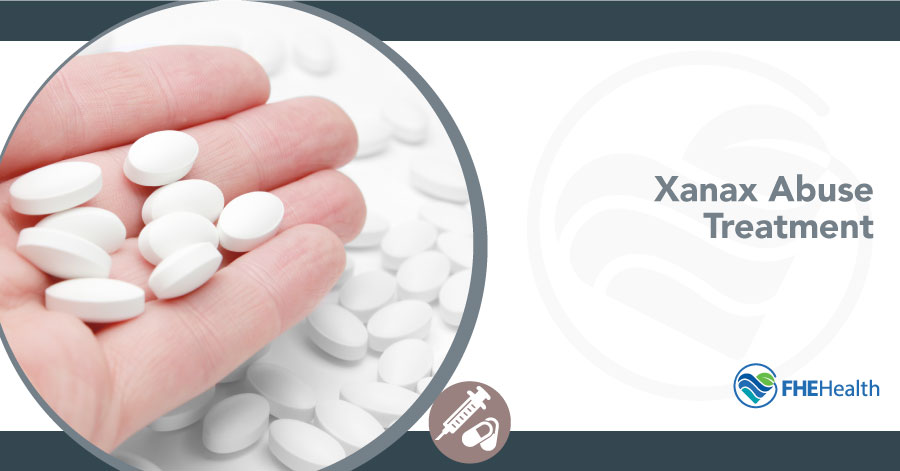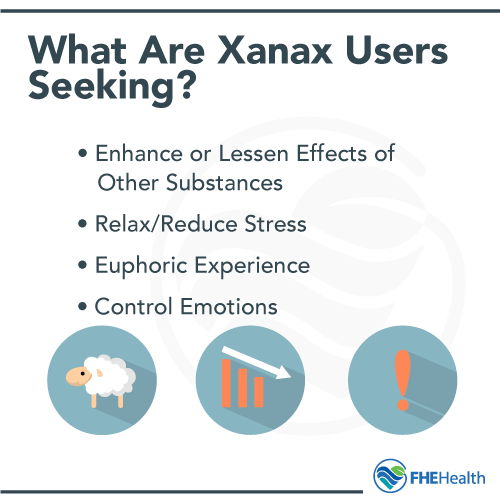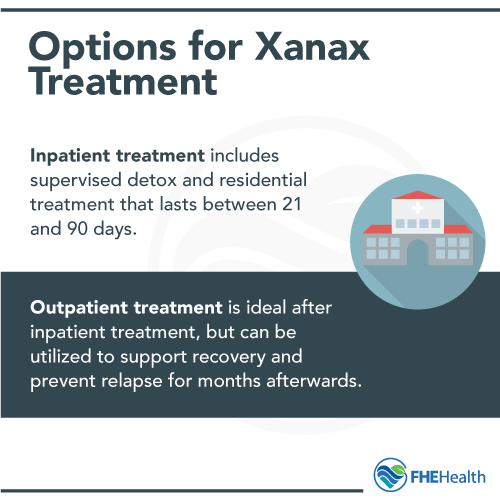
What is Xanax?
Xanax belongs to a class of medications known as benzodiazepines, which have sedating effects that make them useful in the treatment of anxiety disorders and panic disorder. This medication makes the user feel calmer and more relaxed. In some users, Xanax also produces a sense of euphoria that can lead to physical dependence or chemical addiction, making it important for rehabilitation facilities to offer Xanax abuse treatment.
 Xanax abuse is a serious problem in the United States and abroad. The National Institute on Drug Abuse reports that approximately 2.1 percent of American adults misused benzodiazepines like Xanax at least once in 2016. Users report that they misuse Xanax for the following reasons:
Xanax abuse is a serious problem in the United States and abroad. The National Institute on Drug Abuse reports that approximately 2.1 percent of American adults misused benzodiazepines like Xanax at least once in 2016. Users report that they misuse Xanax for the following reasons:
- Enhance or lessen the effects of other substances
- Relax/reduce stress
- Get high
- Improve sleep
- Experiment
- Keep emotions under control
If you are struggling with Xanax addiction or using it outside the scope of prescription, take comfort in knowing that help is available. FHE Health has helped thousands of people overcome their addictions and get started on the path to a successful recovery.
Treatment can begin quickly and discreetly, get started now According to the US Food & Drug Administration, Xanax has an average half-life of 11.2 hours. This means that it typically takes around 11.2 hours for half of the Xanax to be eliminated from your body after you stop using it. Therefore, there’s no formal detoxification period for Xanax as there is for other types of substances. Although there’s no lengthy Xanax detox period, withdrawing from Xanax can produce some uncomfortable withdrawal symptoms. Possible symptoms of Xanax withdrawal include: The right treatment can address and relieve these symptoms, helping patients transition more smoothly through medical detox into recovery. The length of a person’s inpatient stay will depend on their treatment needs. These are assessed—and a treatment plan developed upon admission. (For example, at FHE Health, if you decide to pursue residential Xanax abuse treatment, you’ll first undergo a thorough assessment to determine how we can best support your physical and psychological needs. From there, together we’ll draw up a treatment plan that will help you meet your recovery objectives.) Generally, most individuals will stay in rehab for anywhere between 21 and 90 days. Outpatient Xanax abuse treatment programs are ideal for people who need continued support after completing a residential program. You may also want to enroll in an outpatient program if you have a supportive home environment and want to continue working or going to school while getting treatment. Partial hospitalization programs are a step-down level of care from inpatient rehab. These programs typically combine the same structured nature of residential rehab with an outpatient experience. For instance, at FHE Health, patients in our partial hospitalization program continue to participate in daily therapies for most of the day but do not live on-site at our facility. Less structured than partial hospitalization programs, intensive outpatient programs are usually the next step down in care: They scale back the amount of time spent in therapy even more, so that patients had more free time to spend re-acclimating to life after rehab, looking for jobs, finding new living arrangements, etc.. At the same time, though, these treatment programs retain enough of a daily structure to reassure patients that the same “handrails” or “training wheels” are still there to support them in their newfound freedom. Treatment for Xanax addiction provides the structure and support necessary to manage addiction triggers, improve coping skills, and teach healthy habits in place of negative behaviors. Patients have access to a team of professionals who are committed to their success, along with the opportunity to build relationships with peers who truly understand the challenges of overcoming an addiction to Xanax. If you’re wondering how long Xanax abuse treatment lasts, the answer is that it depends on your individual circumstances. Several studies have confirmed that the more time you spend in treatment, the more successful you’ll be at abstaining from substance use. For example, in a study published in the American Journal of Drug and Alcohol Abuse, women who spent more than six months in treatment had much higher rates of success than women who received short-term treatment. Their chances of success improve if a person combines residential Xanax abuse treatment with ongoing outpatient treatment. Receiving outpatient Xanax abuse treatment after discharge from a residential program can help patients stay motivated and learn how to avoid addiction triggers as they transition to their normal routine. Cognitive behavioral therapy is often used in Xanax abuse treatment. During a CBT session, you’ll talk with a therapist about your addiction. Your therapist may ask questions about your physical and emotional health to uncover any hidden issues that could be contributing to your Xanax use. Your therapist may also ask you to set a goal for treatment and then work with you to achieve that goal. You’ll have the opportunity to discuss your feelings and get help overcoming any challenges you face as you complete your Xanax abuse treatment and work to remain sober. 12-step facilitation therapy is also used in Xanax abuse treatment. This form of therapy is designed to help you get involved in a 12-step program and stay engaged in that program, which can reduce your risk of relapse. During 12-step facilitation therapy, your therapist will ask you to acknowledge that your addiction is a lifelong disease, accept support from others, and remain committed to attending 12-step meetings. No medications are prescribed specifically to treat Xanax addiction, but some medications may be used to control withdrawal symptoms. Anticonvulsants—drugs used to prevent seizures—have shown some promise in making the withdrawal process more comfortable. The drug flumazenil may also be used to speed up the withdrawal process, which relieves some of the most unpleasant symptoms and side effects. Holistic treatments such as meditation, yoga, and mindfulness may lower the risks of relapse by reducing stress, fostering relaxation, and improving patients’ coping skills. Massage is another holistic treatment that research suggests has multiple physical and psychological benefits. The right structure and support can make a tremendous difference when it comes to avoiding relapse. If you’re ready to stop using Xanax and learn healthy coping skills, call FHE Health at 833-596-3502. Our team of experienced professionals is ready to help you discover how rewarding life can be without Xanax and other substances for long-term recovery. Kristina Robb-Dover is a content manager and writer with extensive editing and writing experience... read moreNeed Help?
Xanax Detox – How is Addiction Treated?
Inpatient Xanax Treatment
 Inpatient (or residential) rehab—the highest level of substance abuse care and support—usually consists of a medically supervised detox, followed by intensive therapies that address the roots of a patient’s Xanax addiction. The added structure and support of an inpatient program remove outside distractions so that patients can focus on their recovery, increasing their chances of success. Among those distractions: the “people, places and things” that once triggered a person’s Xanax abuse.
Inpatient (or residential) rehab—the highest level of substance abuse care and support—usually consists of a medically supervised detox, followed by intensive therapies that address the roots of a patient’s Xanax addiction. The added structure and support of an inpatient program remove outside distractions so that patients can focus on their recovery, increasing their chances of success. Among those distractions: the “people, places and things” that once triggered a person’s Xanax abuse.Outpatient Xanax Treatment
Why Does Xanax Addiction Need Treatment?
What Are the Therapies Used in Treating Xanax Addiction?
Cognitive Behavioral Therapy
12-Step Facilitation Therapy
Medical and Holistic Treatment for Xanax Addiction
Contact Us
![]()
About Kristina Robb-Dover






